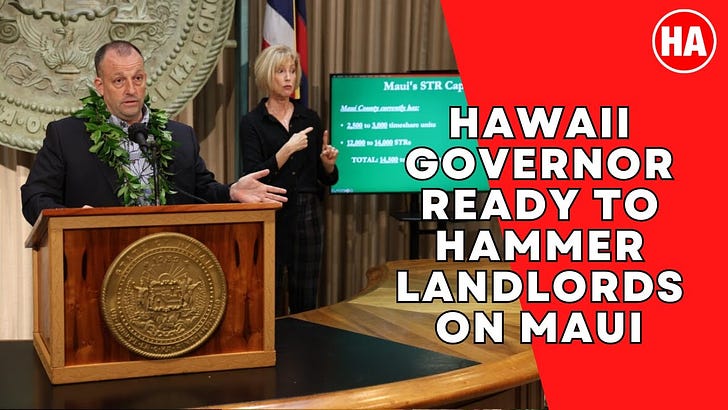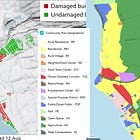How the Government can "Legally" Steal Your Property
How would you feel watching a wrecking ball demolish your personal property?
Friends,
I don’t really trust the government. How about you?
In yesterday's videos, I shared important updates about the latest news from Hawaii and the incremental steps Josh Green-new-Deal is taking to strategically strangle property owners and Maui residents. This ties in with the concept of eminent domain (aka: how the government can legally steal your property), a topic that hits close to home, prompting me to share a personal story about eminent domain.
Click below to watch my video with my disheartening personal family story about the government’s wrecking ball — literally!
Eminent domain is a legal concept that empowers governments to legally steal… I mean “acquire” private property for public use, with “just compensation” provided to the property owner. The application of eminent domain raises complex questions about property rights, government authority, and fair compensation.
Eminent domain, also referred to as the "taking clause" of the Fifth Amendment of the United States Constitution, explicitly declares that private property cannot be seized for public use without just compensation. When a government entity determines the necessity of acquiring private property, it must provide the property owner with “fair” compensation. The underlying idea was that there may be situations that arise wherein the government requires a legal mechanism to acquire property crucial for public projects, including but not limited to the development of roads, schools, and other infrastructure projects.
The biggest debate surrounding this constitutional provision is the proper balance between the public interest and the protection of private property rights.
Obviously the power of eminent domain can be abused, leading to instances where private property is seized for economic development rather than genuine public use.
One of the more controversial eminent domain cases is Kelo v. New London. In the Kelo case, the Supreme Court ruled that the government could use eminent domain for economic development purposes, even if the property was eventually handed over to private developers.
“Kelo v. City of New London, 545 U.S. 469 (2005),[1] was a landmark decision by the Supreme Court of the United States in which the Court held, 5–4, that the use of eminent domain to transfer land from one private owner to another private owner to further economic development does not violate the Takings Clause of the Fifth Amendment. In the case, plaintiff Susette Kelo sued the city of New London, Connecticut, for violating her civil rights after the city tried to acquire her house's property through eminent domain so that the land could be used as part of a "comprehensive redevelopment plan".[2] Justice John Paul Stevens wrote for the five-justice majority that the city's use of eminent domain was permissible under the Takings Clause, because the general benefits the community would enjoy from economic growth qualified as "public use".[1]
After the Court's decision, the city allowed a private developer to proceed with its plans; however, the developer was unable to obtain financing and abandoned the project, and the contested land remained an undeveloped empty lot.”[3][4]
This decision ignited a nationwide discussion about the limits of government authority in property takings. In response to concerns about potential abuse, some states have enacted legislation to restrict the use of eminent domain for economic development purposes.
In my recent video linked above, I've provided an overview of eminent domain laws in Hawaii. According to both Hawaii state and US federal laws, private property can only be taken for public use. Considering the current situation on Maui and Joshie’s greedy intentions, it raises concerns about the real potential for the dictator… I mean Governor to employ the use of eminent domain to acquire these damaged properties for public housing.
Mark my words this is what’s going to happen.
Read more about Eminent Domain in Hawaii
I love my Healthy American audience! Enjoy some interesting insights…
And please share your thoughts in the comments below.
Read Next:
Thank you for being a reader of my substack. All content is free upon publication to all readers. A special thank you to those who support my work with a paid subscription.
My commitment is to truth and freedom, and to empower you to analyze issues with a critical mind so you are not bamboozled by the bad guys and hoodwinked by the hogwashers. Let’s keep exposing evil and shining the light of truth, shall we?
Join me daily at 4 pm Pacific / 7 pm Eastern for my live broadcasts on my Healthy American Youtube channel here.
Watch Next:













UNDER UCC18 SUBJET matter jurisdiction--turning a right into a privilege is a violation of rights. usc18--241, 242 THAT IS A CRIME. ( fines and prison up to 20 years). Also see usc18, 1341. Also goes against Sherman Anti Trust Act, USC15--articles 1-7. The Sherman Anti Trust and also Clayton Act are in place to protect the individual from being over powered by the state. “Any attempt by the state to convert the claimant’s property into a commercial asset for the benefit of municipal corporations without just compensation is a Tort condemned by: see case City of Monterey V Monty Dunes. The SCOTUS ruled that municipal corporations cannot convert property that is not owned by them. There is no expiration date on the “takings clause” of a man’s property for cities illegal enforcement of its codes restricting a man’s business or property. See Plazolo V Rhode Island (2001 case). Code enforcement cannot take place unless property is lawfully acquired FIRST.
How ironic that this suddenly comes to light as Israel - as we speak - literally demolishes and steals Palestinian property 24/7/365...